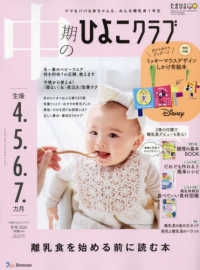- ホーム
- > 洋書
- > 英文書
- > History / World
Full Description
This book spotlights the trajectories of young women and men navigating the turmoil of the early twentieth century.
From the end of the First World War to the aftermath of the Second World War, Europe witnessed fundamental changes in the social regimes that determined power distribution. Against this backdrop of the struggle between democratic and authoritarian projects, amid both war and fragile peace, young people increasingly became a target of state legislation, (mass) organizations and other institutions. The authors of this collective volume approach the first half of the twentieth century through the lens of age and gender as interdependent categories of analysis. In doing so, they reveal how adult perceptions of youth and gender framed young men and women's lives as well as their roles in society. The authors also explore how these perceptions collided with youth agency, probing the specific age- and gender- related dynamics of empowerment and organization. By focusing on the young actors and the institutional settings that limited their scope of action, the authors contrast processes of wayward agency with institutionalized attempts to control and lead 'the young'. As such, this book contributes to a global academic discussion on age, gender, the life cycle and intersectionality.
This book will be relevant for scholars and students in history, sociology, gender studies, and youth studies. It will also be of interest to those studying European history, social movements, and twentieth- century political transitions.
The chapters in this book were originally published as a special issue of European Review of History.
Contents
Introduction - Rallying Europe: Young women and men searching for a life and a future
1. Traces of youth: Reconstructing Hungarian women's lives during the Holocaust
2. Unreachable youth: Physical education, national mobilization and intergenerational conflict in interwar Yugoslavia. The case of the Yugoslav Sokol
3. 'Fragt denn da ein junger Mensch nach?': Would a young person ask that? Growing up in the Reichsarbeitsdienst in 1942
4. Una Coscienza Coloniale: forging imperial women in the Fascist Colonial Institute of Bologna
5. The 'New Woman' of Weimar Germany in the imaginations of young Iranian intellectuals
6. 'In this country, women are also soldiers': Interrelations between age and gender in the women's section of the Romanian Legionary Movement
7. Health, home and hearth: How war nurses negotiated their place at the table during the dawn of Francoist Spain
-

- 電子書籍
- ちくま 2024年10月号(No.64…
-

- 電子書籍
- 絶世の武魂【タテヨミ】第67話 pic…
-

- 電子書籍
- 第8話 世界を変えるようなヤツ コルク…
-

- 電子書籍
- バトラビッツ: 2 ZERO-SUMコ…




